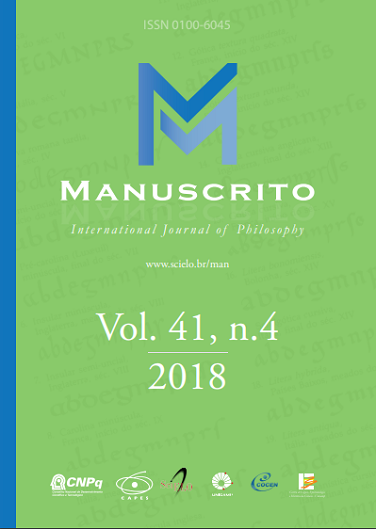Resumo
Most philosophers assume (often without argument) that belief is a mental state. Call their view the orthodoxy. In a pair of recent papers, Matthew Boyle has argued that the orthodoxy is mistaken: belief is not a state but (as I like to put it) an act of reason. I argue here that at least part of his disagreement with the orthodoxy rests on an equivocation. For to say that belief is an act of reason might mean either (i) that it’s an actualization of its subject’s rational capacities or (ii) that it’s a rational activity (hence, a certain kind of event). And, though belief is not an act of reason in the second sense, it may nonetheless be one in the first: it may be a static actualization of its subject’s rational capacities.Referências
BOYLE, M. Active belief. Canadian Journal of Philosophy, Supplementary Volume 35: 119–47, 2009.
BOYLE, M. ‘Making up your mind’ and the activity of reason. Philosophers’ Imprint 11(17), 2011.
BOYLE, M. Die Spontaneität des Verstandes bei Kant und einigen Neokantianern. Deutsche Zeitschrift für Philosophie 63(4): 705–726, 2015.
BROOME, J. Rationality Through Reasoning. Oxford: Wiley-Blackwell, 2013.
CASSAM, Q. Judging, believing, and thinking. Philosophical Issues 20: 80–95, 2010.
COMRIE, B. Aspect. Cambridge: Cambridge University Press, 1976.
HIERONYMI, P. Controlling attitudes. Pacific Philosophical Quarterly 87(1): 45–74, 2006.
HIERONYMI, P. Two kinds of agency. In O’Brien and Soteriou 2009: 138–162, 2009.
KENNY, A. Action, Emotion, and Will. New York: Routledge & Kegan Paul, 1963.
KORSGAARD, C. The activity of reason. Proceedings and Addresses of the American Philosophical Association 83(2): 23–43, 2009.
KOSMAN, A. The Activity of Being. Cambridge, MA: Harvard University Press, 2013.
KOZIOLEK, N. Inferring as a way of knowing. Synthese. url: doi.org/10.1007/s11229-017-1632-4, 2017.
KOZIOLEK, N. MS. Belief as the power to judge.
LEE, W. Reasoning, rational requirements, and occurrent attitudes. European Journal of Philosophy. url: https://doi.org/ 10.1111/ejop.12342, 2018.
MCHUGH, C. Judging as a non-voluntary action. Philosophical Studies 152: 245–269, 2011.
MCHUGH, C. Epistemic responsibility and doxastic agency. Philosophical Issues 23: 132–157. 2013.
MOURELATOS, A. P. D. Events, processes, and states. Linguistics and Philosophy 2: 415–434, 1978.
O’BRIEN, L. and SOTERIOU, M. (editors). Mental Actions. Oxford: Oxford University Press, 2009.
O’SHAUGHNESSY, B. Consciousness and the World. Oxford: Clarendon Press, 2000.
OWENS, D. Reason Without Freedom: The Problem of Epistemic Normativity. Oxford: Routledge, 2000.
PEACOCKE, C. Conscious attitudes, attention, and self-knowledge. In Wright, Smith, and Macdonald 1998.
RÖDL, S. Self-Consciousness. Cambridge, MA: Harvard University Press, 2007.
RÖDL, S. Self-Consciousness and Objectivity: An Introduction to Absolute Idealism. Cambridge, MA: Harvard University Press, 2018.
RYLE, G. The Concept of Mind. Edited by Daniel C. Dennett. Chicago: The University of Chicago Press, 2000, 1949.
SHAH, N. and VELLEMAN, J. DAVID. Doxastic deliberation. The Philosophical Review 114(4): 497–534, 2005.
SHOEMAKER, S. Self-intimation and second order belief. Erkenntnis 71: 35–51, 2009.
SOTERIOU, M. Mental action and the epistemology of mind. Noûs 39(1): 83–105, 2005.
STEWARD, H. The Ontology of Mind: Events, Processes, and States. Oxford: Oxford University Press, 1997.
TORIBIO, J. What we do when we judge. Dialectica 65(3): 345–367, 2011.
VENDLER, Z. Verbs and times. Philosophical Review 56: 143– 60, 2011.
WILLIAMSON, T. Knowledge and its Limits. Oxford: Oxford University Press, 2000.
WRIGHT, C., SMITH, BARRY C. AND MACDONALD, C. (editors). Knowing Our Own Minds. Oxford: Clarendon Press, 1998.

